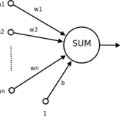Methods to deal with systematic model errors are an increasingly important component of modern data assimilation systems and their effectiveness has increased in recent years thanks to advances in methodology and the quality and density of the global observing system. The weak constraint 4D-Var assimilation algorithm employed at ECMWF is well suited to the estimation and correction of model errors as they are explicitly accounted for in the cost function. This has led to significant improvements in recent years to the accuracy of stratospheric analyses. One question that remains open is about the estimation of the model error covariance matrix to use in weak constraint 4D-Var. Encouraged by the promising results we have obtained in the recent past through the use of Artificial Neural Networks (ANNs) to estimate slowly-varying model errors in the ECMWF assimilation cycle, we explore in this work the use of ANNs to sample the model error distribution and provide an alternative way to construct a model error covariance matrix. Results from the application of the new model error covariance in cycling assimilation experiments are described and implications for further developments of the ECMWF data assimilation system are discussed.
翻译:处理系统模型错误的方法是现代数据同化系统的一个日益重要的组成部分,近年来由于方法的进步和全球观察系统的质量和密度,其有效性有所提高。欧洲地中海环境基金采用的4D-Var同化算法薄弱,非常适合模型错误的估计和纠正,因为成本函数中明确计入了这些错误。这导致近年来平流层分析的准确性有了显著改善。一个尚未解决的问题是估计模型差错差变矩阵,以便用于4D-Var的薄弱制约。我们最近通过人工神经网络(ANN)来估计欧洲地中海环境基金同化周期中缓慢变化的模型错误,取得了令人振奋的结果,我们在此工作中探索如何使用非典型差错分布样本,为构建模型差差变矩阵提供了替代方法。在循环式同化实验中应用新模型差差变模型的结果,并讨论了对欧洲地中海环境基金数据同化系统进一步发展的影响。





